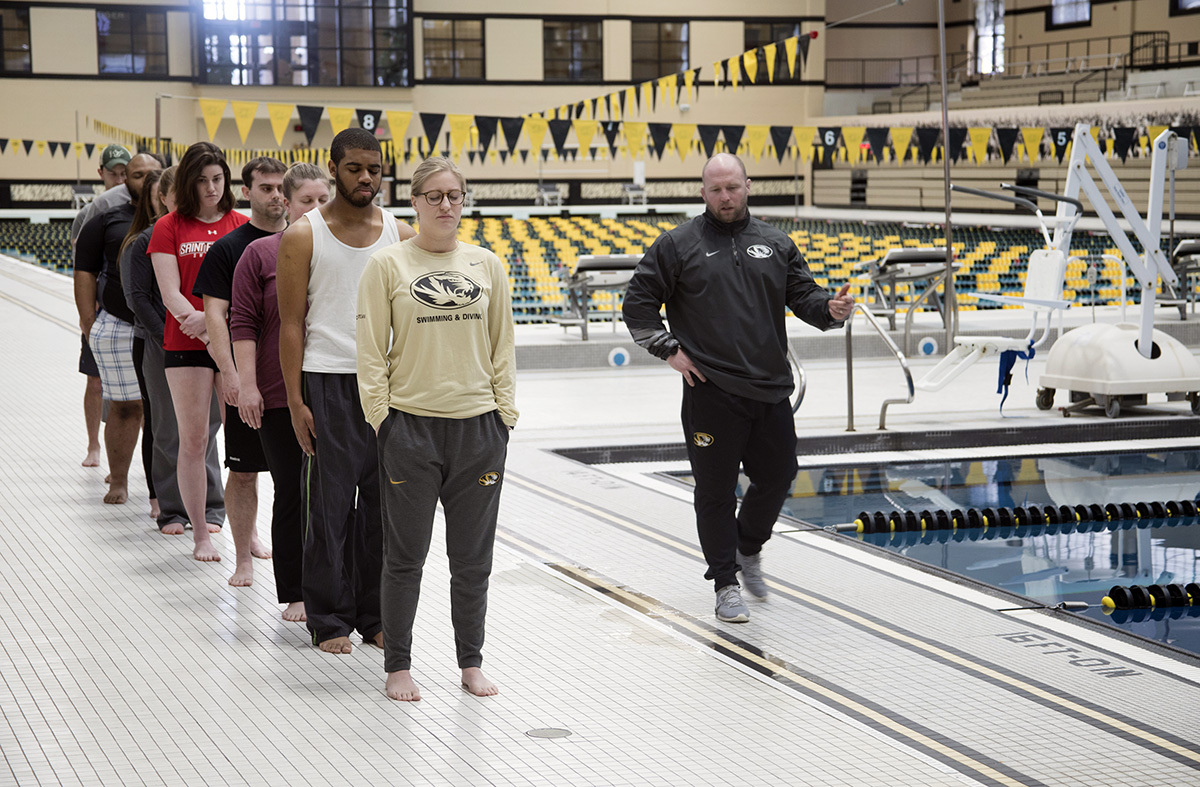Embrace Fear and Jump In
Unique activity illustrates the power of the mindset
One way to “face your fears” is to take the plunge.
In one of Brandon Orr’s Applied Sport Psychology courses, students learn how to manage their mind: even when they’re facing down a ten-meter diving platform above 20 feet of water in the Mizzou Aquatic Center.

Orr, an assistant teaching professor in the Department of Educational, School & Counseling Psychology, had students from his class enact what they learned: that fear is a natural emotion experienced by even the greatest athletes. Accepting that fear and managing responses to that fear can be a strategy for success.


“Anyone who thinks that we are in control of our thoughts and that somehow we can just will ourselves to not think certain thoughts or feel fear, has not jumped off a 33-foot platform,” said Orr. “I wanted my students to feel this fear, but then work to manage their response so that fear did not impede their committed action. Elite athletes experience fear, doubt and uncertainty. My students need to understand how important fear is and how a person can manage their emotional and cognitive response to that fear and move forward in committed action.”
Orr says he teaches a framework called “Acceptance, Commitment and Values-Based Action.” While the natural response to fear for some is to react by giving up or quitting, Orr wants students to accept the thoughts and emotions as impulses that can be overcome. He had the students break the processes down and focus on small goals, such as feeling the tiles beneath their feet, to the more daring goals of walking off the series of platforms.
“We do not choose our thoughts – that’s not how human psychology works – we only choose how we respond in the face of those thoughts and emotions,” said Orr. “If a person is mindful, focuses on instructional cues and internal or external stimuli to occupy the mind, they can focus their attention and counter the potentially destructive influence of fear. This platform exercise links the theory of sport psychology with practicable sport behaviors, and my students will be able to teach this concept because they’ve lived it.”
“Jumping off the platforms allowed us to create real fear and anxiety for ourselves, which is so important when we try to empathize and understand the psychological universe of the athletes and performers we work with,” said Mike Breske, a doctoral student in Counseling and Sport Psychology.

Each student challenged their personal comfort zone. For some, it was going off the highest springboard. For others it was confronting one of the lower platforms, and for others it swimming in the deep end of the pool.
Orr’s courses, which include Positive Psychology, have been some of the most popular on the Mizzou campus for several years running. Future coaches, instructors, counselors and a host of others are drawn to the topics of resiliency, motivation and persistence, as striving and achieving excellence resonates across career fields.
“We work with the students to build psychological skill development to manage their cognition and emotion during the performance, no matter how the performance is defined,” said Orr. “It’s about skill execution, and whatever the value-based action might be, we teach you how to get there.”

The positive coaching program is entirely online. For more information visit: https://cehd.missouri.edu/degree/positive-coaching-med/. For more information on sport psychology, visit: https://cehd.missouri.edu/degree/sports-psychology-med/
Photos and story by Steven Adams